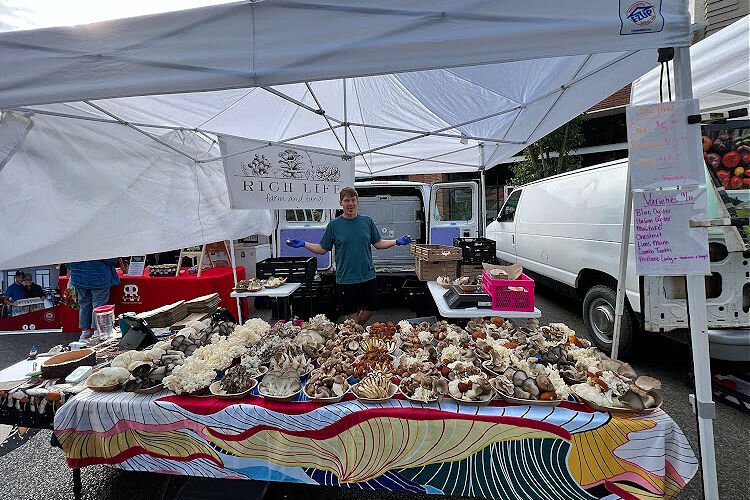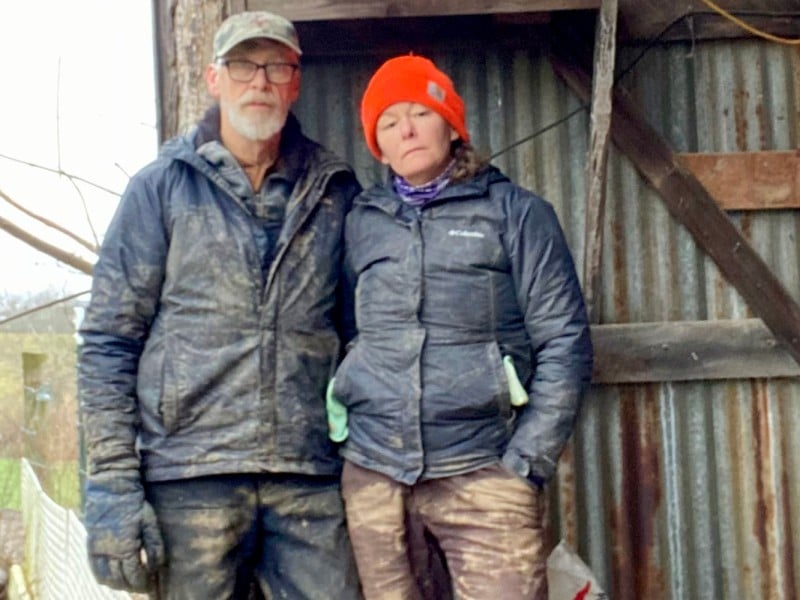Growth industry: Local farmers describe how they got in and stayed in the business
Two local farming families took very different paths into the business.
For many consumers, “buy local” has become a credo as they consider the carbon-footprint impact of shipping produce cross-country or from abroad. Wanting to support their community’s economic growth is another key priority that steers them toward offerings from local farms, as is the sense of community gained from farmers’ markets as we strengthen neighborhood connections in the post-pandemic world. And, finally, fresher produce grown closer to home tastes exponentially better.
Rich Life and Neltner Farms took very different paths to farming: one was conducting a radical lifestyle reboot amid the depths of COVID-19, whereas the other has several generations of connection to their land and has diversified into making onsite events a revenue stream. However, their passion for their farms and communities is a common thread.
A future in fungi
Emalee and Pete Richman chose an interesting time to pull up stakes and migrate from western North Carolina to Greater Cincinnati. Living near Asheville, they had developed a hobby of cultivating mushrooms, and in March 2020, decided to move to New Richmond (Pete is a Cincinnati native) on 10 acres of land. He held a degree in research conservation, but decided to lean on his experience working on an organic farm rather than a career harvesting timber or fighting wildfires. With a sociology degree, Emalee’s path diverged further from her field of study.
“Before moving to this area, we’d done market research, and decided that there was opportunity for a mushroom grower,” she said. “I was blown away by how quickly they grew, and how underestimated they are as a sustainable, nutritious food.”
Mushrooms are a ubiquitous staple in Asia and Eastern Europe, but Emalee noted that the U.S. only consumes 1% of the world’s mushrooms (think of how many people you know who turn up their noses when offered fungi – more for me, I say, but I digress). However, as demand grows for protein-rich (and, oftentimes, soy-free) meat alternatives, mushrooms provide a solid choice.

The Richmans christened Rich Life Farm, and began production in 2021, peddling their wares at the Hyde Park Farmers Market (May-October in Hyde Park Square, November-April at Madtree), and eventually adding the Northside Farmers Market on Wednesdays from spring through fall. The Richman’s growing capacity spans 2,000 square feet, with an annual yield of approximately 500 pounds. Two of its most popular varieties include blue oyster, a versatile performer that accounts for roughly half of its production, and lion’s mane, a uniquely shaped variety with known medicinal purposes that also contains high levels of moisture and replicates seafood quite well.
As its reputation has grown, Rich Life became a wholesale supplier to ETC Produce at Findlay Market and popular restaurants such as Rich’s Proper Food and Drink, Mita’s and St. Francis A Pizza. It has also cultivated lion’s mane mushrooms into bottled tinctures that provide reported neurogenerative properties that improve cognitive health.
The Richmans are in the process of renovating a former 19th-century general store in downtown New Richmond to create a retail storefront for its fungi products and to offer eggs, which is a nascent part of its business. Emalee said they purchased chicks from Mt. Healthy Hatchery with the hope of hens who will lay 15-20 dozen eggs per week.
To other aspiring farmers, Emalee says, “It’s not just a job; it’s really a lifestyle. You have to accept that there will be trial and error and fits and starts. Not everyone can afford to just buy a tractor, so it will take time. It’s important to find a like-minded community that will support you.”
Upholding a family legacy
Neltner’s Farm was founded in 1892 on 50 acres in Melbourne in central Campbell County. Kevin Neltner represents the fourth generation of his family to work his family’s land. His son Brendan is well on his way to being the fifth. Kevin noted that adapting to trends is key to a family business surviving so long.
“When I first started in the business 40 years ago, we sold in larger volumes to fewer customers, because so many people did their own canning at home,” he said. “Now that people don’t do that much anymore, we have to sell to more people who are going to buy to eat them fresh more often.”
Farmers’ markets have become an essential part of their business. It sells at three markets across Campbell County, as well at the market at Nativity Church in Pleasant Ridge. Tomatoes are always a popular staple, with zucchini, sweet corn, and cucumbers among other offerings. It no longer grows its own apples, but purchases them from neighboring farms to produce apple cider and apple butter.
Another trend Neltner Farms has embraced to stay profitable is agritourism. It’s operated a pumpkin patch where customers can buy their own pumpkins by the pound, and it was expanded into a full-fledged fall festival from late September through October that’s a hearty slice of Americana with hayrides, live music, and expansive Halloween-themed corn mazes. Neltner said that roughly 15,000 people attend annually.
For the last 12 years, Neltner’s Farm has offered its spaces for rustic weddings that accommodate up to 350 guests. Rustic accents such as farmhouse tables, covered-wagon rides and straw couches provide distinctive touches for memorable experiences.
Neltner said that increasingly fickle weather requires more careful preparation, but said an effective irrigation system and keeping a field full of diverse crops helps minimize the impact of heat waves or sporadic downpours.

















